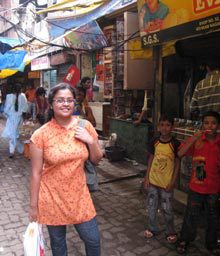Sudev Jay Sheth
Responding to an earlier work by ethnomusicologist Daniel M. Neuman entitled The Life of Music in North India (1980), my research topic aims at understanding how the life of music has evolved in the quarter-century since that seminal study was published. The creation of both public and private institutions of teaching, research, documentation, archiving, and performance have significantly increased since Neuman’s work. Accordingly, I will explore how they have impacted the life of music rather than accepting at the outset that they have played a favorable role. I will be […]
Natalie M. Avalos
I am interested in verifying the existing research on the correlations between Tibetan Buddhist sacred knowledge and Native American sacred knowledge. I will focus specifically on Hopi Indian knowledge. I intend to explore the relationship between practices, beliefs and their metaphysical understanding of the world. Additionally I will investigate the idea of being connected to all things, a belief that they share; looking at how this process manifests itself from an internal to an external awareness or vice versa. Ultimately I would like to know the significance of their correlations […]
Meghan Elisabeth Lowe
My history thesis project will analyze the Santiago de Chile of 1964 to 2006 from the perspective of shantytown women, with an emphasis on the community institutions that offer them employment, personal development opportunities and/or activism networks. I will examine what poor women do within these institutions, why these opportunities are significant in their lives and what this civic participation represents in the greater context of womens rights in Chile. Additionally, I will examine the consequences of dictatorship and democracy on shantytown women, to determine whether poor women have greater […]
Yehuda Donde
I am working in a field of public finance that aims to develop a model indicating the optimal level of redistributive taxation in a given community. Assuming that public preference to redistribute income is determined by some combination of self-interest and civic altruism, the model must take into account the community’s various social, behavioral, and economic attributes. Using surveys, I will be gathering data on the effects of social factors, such as group cohesion, and behavioral factors, such as aversion to risk, on the tax policy decisions of kibbutzim – […]
Brittany Gabel

International tourism provides tourists with a physical space that allows them to encounter new experiences, exotic places, and unfamiliar cultures. For the most part, these experiences abroad stimulate inter-cultural contact, which results in the formation of an ethnic relation between strangers. My research aims to identify the different affinities, misunderstandings, and stereotypes that can characterize this relationship in the tourist setting of San Jose, Costa Rica. I will study two groups: tourists from the United States who come to San Jose for short-term vacations and tour-guides from Costa Rica who […]
Yael Danovitch

HIV/AIDS remains a significant threat to many countries in sub-Saharan Africa. In order to understand HIV transmission in this context, it is crucial to understand the practices and understandings that facilitate its spread. In Malawi, HIV is spread primarily through sex, and sex itself constitutes a deeply culturally embedded practice. With this in mind, I will be spending this summer in Malawi examining the way in which discourses on sex influence HIV/AIDS patterns. Drawing on a collection of conversational journals collected by the Malawi Diffusion and Ideational Change Project of […]
Pronita Saxena

Anecdotal evidence suggests an information gap isn’t the sole propagator of preventable water-borne diseases in urban slums: behavior change is multivariate. Through household surveys, I wish to understand how financial decision-making structures and other socio-economic factors condition the likelihood that a particular household will or won’t treat its water. To challenge the idea that with limited income, spending is allocated first to some universal standard of basic needs and then to “unessential” goods, I am also recording current technology investments (such as televisions, radios, etc.) within households to reconfigure “affordability” […]
Elizabeth Chapman
Hoo Yin (Horace) Lit
Gavin Alle Raders
Conflicts over the control of natural resources lie at the heart of wars, violence, and terrorism worldwide. Water is the most precious resource for over 800 million farmers in India who depend on the groundwater for their physical and cultural survival, and water has been held for millenia to be the common property of all beings, to be maintained and distributed democratically at the decentralized village level. Control over water was transferred to the state during British colonial rule, and today rain and groundwater is being privatized by multinational corporations […]